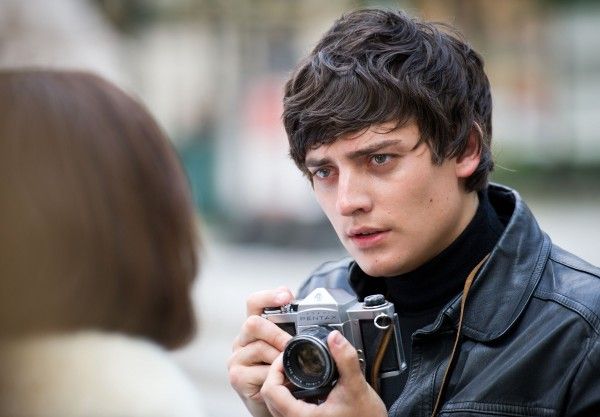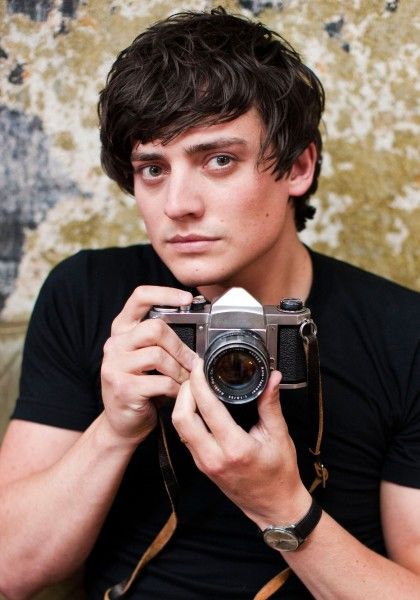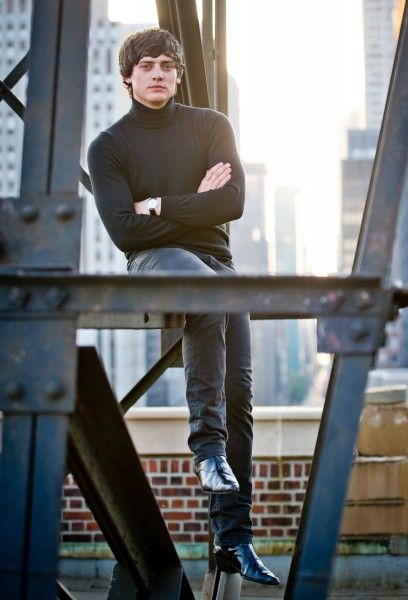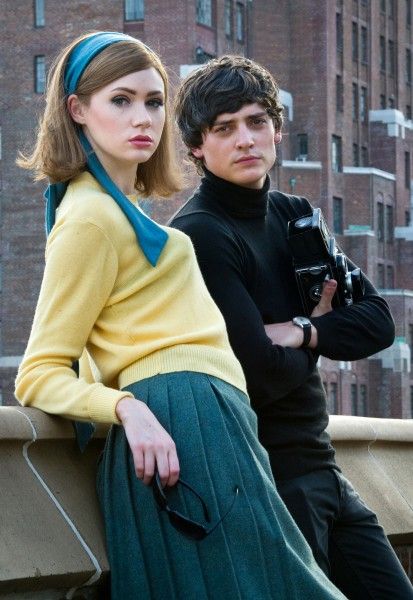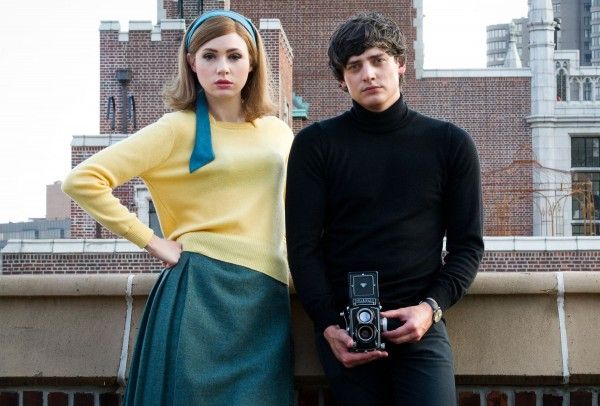We’ll Take Manhattan tells the story of famed British photographer, David Bailey (Aneurin Barnard), and his model and muse, Jean Shrimpton (Karen Gillan), who together revolutionized the world of fashion photography. Setting out from London to Manhattan in the 1960's, for a historic photo shoot for British Vogue, the brash and visionary Bailey refused to conform to the status quo and the now iconic photos that resulted, with Shrimpton posing in haute couture on the gritty streets of New York City, became the definition of a new generation of celebrity chic.
During this exclusive interview with Collider, actor Aneurin Barnard talked about being put through the paces to play David Bailey, his process for approaching embodying the man at this particular time in his life, the great moment when he got an email from Bailey telling him that he loved his performance, and how much fun he had working with Karen Gillan (known for her work as Amy Pond on Doctor Who). He also talked about what he looks for in projects and roles, and his first American film role in Emanuel and the Truth About Fishes. Check out what he had to say after the jump.
Collider: How did you come to be playing David Bailey?
Aneurin Barnard: I had to audition for this one because it was David Bailey. Every actor in Europe wanted to play this role, and why not? It’s a great story and a great character piece to play, as an actor. So, everyone was put through the paces, to get the David Bailey role. I was actually filming another movie, at the time, north of England, and had to travel down on a train, get in and do the meeting, and then go back on set and film. There were a few meetings. First, I auditioned, and then there were a few meetings afterwards, just to make sure everything was what they wanted. I had to prove my worth to play the role. That’s how it came about.
For people who aren’t familiar with David Bailey, what can you say about who he is and the impact that he had on fashion?
Barnard: Well, David Bailey is this London lad, who’s 74 now. He was born in a place called Leytonstone, which is in east London, and he grew up in a tough place called East Ham, which is in east London, too. He had a difficult childhood and ended up serving in the army. When he was about 19, he left and started photography. He became an assistant at the John French studio, and his love for photography got greater and greater. He was inspired a lot by Picasso’s work, and wanted to bring that into photography.
So, he is this London photographer who stormed the early ‘60s with his photography because he broke every rule. At that point, fashion photography for people like Vogue had these Greek poses and it was all about the clothing and labels. It was never about the photographer or the person in the pictures. It was just about what you saw. David Bailey went, “I don’t want that. I’m going to make it about the person and the individual. I’m going to change the background from a silk curtain to a rusty chainlink fence in front of the U.N. building in New York, and I’m going to have the model wear glasses, which is unheard of, and she’s going to have modern hair and not look like she’s from 1920.” That happened in the ‘50s and early ‘60s.
He liked to be called Bailey, and he just toyed with people. If there was something to go against, he’d go against it. Obviously, he thought, “Why do we have to stick to one cause when there’s another option?” He was always the one to flip the coin and go for the other side. He’s a very powerful guy, in his presence, and he swears quite a lot and doesn’t care about that. That can seem very aggressive and rude, but it’s not. It’s just the way he talks. It’s where he comes from and the way he was brought up. He’s actually very charming and respectful, but he’s had a bit of a life.
He’s been with a lot of women, he’s partied very hard, and he’s great friends with Mick Jagger. He changed the way images for fashion were taken. He knew what was coming in the world, before it was happening. If you say no to David Bailey, you fuel him to do more of it. That’s why he’s such a fun character. As an actor, there were so many levels to play. He does have a heart, but he’s also very fast-driven, in this mind, and very stubborn.
When you play someone like this, who is a real person, how much research do you do versus just focus on this one time period in the script?
Barnard: In all honesty, what I did for this was just look at everything that we covered in the script. Everything after that, I didn’t look at, even though I know it now. What was important for me was everything we covered in the script and everything before. The history before that needed to be played into the moments that you see in the film, so I researched where he grew up, his family, his mother, his inspirations, and then the cameras, tripods and lighting he was using, what he wore, and the music that he listened to, and all those little things that you don’t need to know, as an audience member, but that I needed to know, as an actor. In different situations, he would act in different ways because of what’s happened in his past, so it was all about his past for me.
Was it about finding a balance between how he was in real life and what you wanted to bring to your portrayal of him?
Barnard: Yeah, it was because David Bailey is such a strong character and could be a little bit too much. We were making a feature movie that was an hour and a half, so I was really adamant and concerned with delving into finding his character and being exactly the way he is, to the point that he would agree with it, but also show that he’s not a bad person. He’s a really charismatic, lovely guy, as well. I wanted to show the reasons behind what he did. He doesn’t do that. He never would change something he’d done, or try to explain or apologize for it. I just wanted to show that maybe there was a greater reason why he was doing it and why he could be so strong-minded. So, there were elements that I brought to it that weren’t necessary, but might give a more truthful image of who he is, in the bigger picture.
Did finding out that both David Bailey and Jean Shrimpton liked the film, allow you to breathe a sigh of relief?
Barnard: Yeah. The only person I was really concerned about, when we were doing this, was David Bailey. No one else. I wasn’t even too worried about Jean Shrimpton. I was just completely and utterly worried about David Bailey, especially with how harsh he can be. He’s so truthful, and he doesn’t back off for anyone. He’ll tell you his opinion, whether it’s good or bad. He doesn’t care. That’s a bit disconcerting, especially when you’re playing David Bailey and he’s that honest. He’s not going to lie to you, which I love. I’d rather he be cutthroat and tell me he hated it then try to make me feel better.
I got an email, after he’d watched it for the first time, and was really terrified, I have to be honest. I was like, “This is the one person I wanted to impress. This email is going to tell me if I’ve achieved my job or not. If he doesn’t like it, I’ve failed.” So, I opened the email and read it, and he couldn’t have been any nicer or said anything better than what he said. It was a great moment for me because then all the weight went off my shoulders, I had a big sigh of breath, and it put a nice smile on my face. Now, I can be happy with the knowledge that he loved what I did.
Did you wait a long time to actually open the email?
Barnard: I did! I looked at the title of the email when I got it on my iPhone, out in the city, and I was like, “I’m not going to open it yet.” I went back to my place, got on my laptop, opened the email, read it and was just over the moon.
What was it like to work with Karen Gillan and develop the relationship between your characters?
Barnard: It was very tricky because David Bailey and Jean Shrimpton are two separate people from separate worlds with separate opinions. It was really important to be able to have a relationship with Karen where we could explore the good stuff, the bad stuff, the arguments, the love, the romance, the disagreements. She was beyond phenomenal. We had a mutual understanding of what we were trying to create with the characters and the relationships, so we had lots of fun. It’s so much nicer to be able to do your job with someone who’s helping you and you’re helping them. Then, it becomes a tennis match where you’re hitting the ball back and forth, and you’re a team.
We had so much fun. It’s a great period and they’re iconic characters to play, so it was great for the both of us. It was a great story with a great script and great subjects with a fun wardrobe and great locations. Me and Karen are younger actors and we’re still youthful and creating our careers, which is exactly what David Bailey and Jean Shrimpton were doing, so we connected with that. It brought a nice energy to it because we understood what they were doing and where they were at, in their careers.
What do you look for, in projects and roles?
Barnard: I do like to know who I’ll be working with because that’s very important, but it doesn’t make my decision ‘cause I wouldn’t know some people and they could be the greatest actor. For me, what’s really important is the director. I want to be challenged. Every job I’ve done so far, every character has been completely different and that’s really important to me because I don’t want to fall into a stereotypical box. Of course, every actor has their box and you have to respect and play for it, but I do love challenging myself. I love every role to be new, and I always like to bring a freshness to every character I play, but that comes down to the script. So, it’s important that it’s a good script with good, truthful characters and truthful subjects. I’m a big believer in playing truth and not doing things for effect. It’s not about whether you look pretty or glamorous. It’s about whether people connect. That’s important to me, in any work I do. For me, the key is always trying to find the connection between the audience and the character I’m playing.
Do you know what you’re going to be doing next?
Barnard: I did my first film in America. It’s called Emanuel and the Truth About Fishes, and I play the character Claude, with Jessica Biel, Alfred Molina, Frances O’Connor and Kaya Scodelario. It’s a great film, and it’s a lovely script with a great cast. It’s all about the detail, and the truth and honesty about a situation in life, and that’s my favorite thing to do. Plus, I got to be American, which was great. I’ve been really looking forward to filming in America, but as American, so it was really exciting for me. I’ve over the moon about it. As a young actor, I have certain actors and actresses I’d love to work with, and Alfred Molina was on my list. It’s always nice when you get to tick off someone on your list.
How does your character fit into the story?
Barnard: Kaya plays Emanuel, and I play her love interest. I would like to think the character is the moment where the audience gets to breathe a little. It’s the lighter story. Some of the rest of the storyline is quite serious and could be quite dramatic and heavy. I’m just this young guy who comes into this girl’s life and relieves her from her problems. Hopefully, he’s a likable character. Let’s see how I ruin that. Hopefully, I got it right. He’s an enjoyable character, who’s not so intense. He’s a truthful, honest, nice guy. There are no hidden secrets about him. He’s not cheating on her, or anything like that. He’s just a genuine, nice guy, who comes into her life and brings a big of genuine happiness to it.
What initially drew you to acting?
Barnard: I come from a coal mining valley, deep in the middle of the mountains. As a kid, I watched movies like A Streetcar Named Desire, The Great Escape and The Apartment. My dad also used to play the LP of The War of the Worlds, with a Welshman actor who’s very well known, called Richard Burton. I fell in love with storytelling, and then the idea of becoming a part of storytelling by being the characters, whether it’s in 1960 or 1215 or the present-day. I just love that.
It’s a craft. I don’t approach my acting as just saying a few lines and then going off-screen. I really invest in trying to make it a craft. Every day is a work day, and I have to work my ass off just as much as any other guy, doing whatever job they’re doing. I believe in commitment and hard work, and hopefully, after that, success comes. As long as I’m enjoying what I’m doing, then that’s fine. That’s what I want. I want to enjoy life. We’re only here for a small ride, so it may as well be a good one. If I can go to work enjoying what I do, then my life becomes a very nice one.
We’ll Take Manhattan premieres on Ovation on March 3rd.

